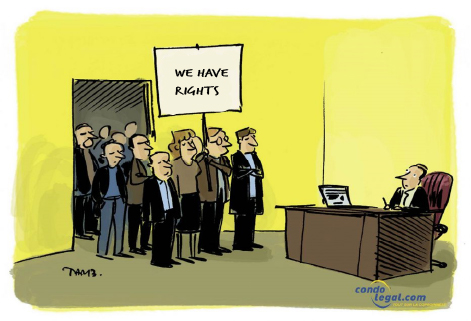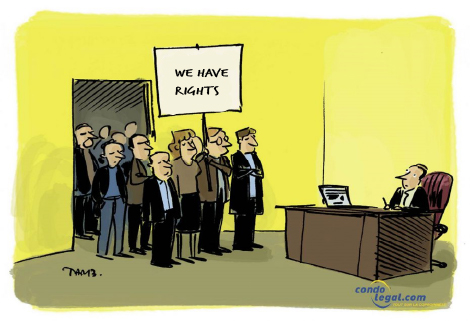Powers of the board of directors
 It is to the board of directors as a whole, as a decision-making body, that the Civil code of Quebec confers the power to administer the affairs of the syndicate. Individual directors do not have any powers unless they have been specially authorized to do so. All decisions concerning the syndicate, the co-ownership or the immovable which is not under the jurisdiction of the meeting of co-owners, are the competence of the board of directors. Its main role is to ensure the preservation of the immovable. As a general rule, it is the decision-making body that ensures the maintenance of its common portions. If necessary, it must undertake the necessary work to ensure its sustainability.
It is to the board of directors as a whole, as a decision-making body, that the Civil code of Quebec confers the power to administer the affairs of the syndicate. Individual directors do not have any powers unless they have been specially authorized to do so. All decisions concerning the syndicate, the co-ownership or the immovable which is not under the jurisdiction of the meeting of co-owners, are the competence of the board of directors. Its main role is to ensure the preservation of the immovable. As a general rule, it is the decision-making body that ensures the maintenance of its common portions. If necessary, it must undertake the necessary work to ensure its sustainability.
General powers
The Board of Directors is responsible for the day-to-day implementation of the syndicate’s mission: the preservation of the immovable, the administration of the common portions and the protection of the rights appurtenant to the immovable or the co-ownership, as well as all operations in the common interest. The Civil Code of Québec and the declaration of co-ownership confers upon it the general powers necessary for this purpose.
Special powers
In addition to general powers, it possesses special powers. Here are some of its prerogatives.
Preservation of the immovable
The Board of Directors must take all the necessary measures to ensure the sustainability of the immovable. It is responsible for:
- Overseeing the common portions maintenance (e.g. purchasing products and supplies, snow removal and signing the various maintenance contracts);
- Insuring the execution of the work required to prevent the deterioration of the common portions of the immovable;
- Requiring an expert report in the event of an apparent lack of conformity;
- Having design or construction defects affecting the common portions of the immovable repaired;
- Taking out insurance against ordinary risks providing for a reasonable deductible and covering the whole of the immovable, except improvements made by a co-owner to his portion, where they can be identified in relation to the description of that portion;
- Determining the sums required to be paid into the self-insurance fund;
- Determining the sums required to be paid into the contingency fund, to cover the cost of work related to major repairs to the common portions, or for their replacement.
Administration of the common portions
The board administers the common portions. This mission covers the management of common areas and equipment of the immovable. To carry out this mission, it must without limitation:
- Fix the amounts needed to cover administrative costs arising of the co-ownership and the immovable;
- Consult the general meeting of co-owners on the budget forecast;
- Adopt the budget forecast by resolution, after consulting the general meeting of co-owners;
- Sent to each co-owners a notice of assessment, indicating the amount of his contribution to common expenses and the date on which they are owing.
- Retain the services of subcontractors to ensure the proper operation of the immovable (e.g. snow removal and landscaping maintenance);
- Oversee the management of personnel;
- Maintain and keep the registers of the co-ownership.
Protection of the rights appurtenant to the immovable and the co-ownership
The Board of Directors must take all necessary steps to defend the interest of the co-owners. It has the power and the duty to represent the community of co-owners, whether civilly or judicially. To fulfill this mission, he must without limitation:
- Convene the meeting of co-owners at least once a year;
- Recover common expenses from co-owners, including those that are past due, due to the omission to pay them by one or more co-owners;
- Exercise against liable third parties (e.g. architect, engineer and contractor) recourses related to the defects of the immovable for which they are liable , and which affect the common portions and even, under certain conditions, the private portions;
- Intervene toward the co-owners or occupants of the immovable, such as with tenants who contravene the declaration of co-ownership;
- Take out insurance protection covering the syndicate’s third party civil liability and for the members of its board of directors and the manager as well as for the president and the secretary of the meeting of the co-owners and the other persons responsible for seeing to its proper conduct.
- Authorize the co-owners of contiguous private portions, through the consent of the mortgage creditors concerned, to modify the boundaries of their private portions;
- Terminate without penalty, if appropriate, within 60 days from the election of the Board of Directors taking over the administration from the interim director, any contract entered into by the syndicate for the maintenance of the immovable, or any other types of services, where the term exceed one year .
 WHAT YOU SHOULD KNOW! The Board of Directors’ mission goes beyond the mere maintenance of the common portions. It also can have work undertaken to improve or transform them, provided that it has obtained prior authorization from the general meeting of co-owners.
WHAT YOU SHOULD KNOW! The Board of Directors’ mission goes beyond the mere maintenance of the common portions. It also can have work undertaken to improve or transform them, provided that it has obtained prior authorization from the general meeting of co-owners.
 WHAT TO KEEP IN MIND: The Board of Directors manages any matter necessary for the proper functioning of the co-ownership. For this purpose, it may appoint a condo manager to assist it in its administrative tasks.
WHAT TO KEEP IN MIND: The Board of Directors manages any matter necessary for the proper functioning of the co-ownership. For this purpose, it may appoint a condo manager to assist it in its administrative tasks.
 WARNING! The priority of the board of directors is to preserve the common areas. The civil liability of the directors could be engaged, if the latter neglects assuming this responsibility adequately.
WARNING! The priority of the board of directors is to preserve the common areas. The civil liability of the directors could be engaged, if the latter neglects assuming this responsibility adequately.
Back to the mega-factsheet Board of Directors
 It is to the board of directors as a whole, as a decision-making body, that the Civil code of Quebec confers the power to administer the affairs of the syndicate. Individual directors do not have any powers unless they have been specially authorized to do so. All decisions concerning the syndicate, the co-ownership or the immovable which is not under the jurisdiction of the meeting of co-owners, are the competence of the board of directors. Its main role is to ensure the preservation of the immovable. As a general rule, it is the decision-making body that ensures the maintenance of its common portions. If necessary, it must undertake the necessary work to ensure its sustainability.
It is to the board of directors as a whole, as a decision-making body, that the Civil code of Quebec confers the power to administer the affairs of the syndicate. Individual directors do not have any powers unless they have been specially authorized to do so. All decisions concerning the syndicate, the co-ownership or the immovable which is not under the jurisdiction of the meeting of co-owners, are the competence of the board of directors. Its main role is to ensure the preservation of the immovable. As a general rule, it is the decision-making body that ensures the maintenance of its common portions. If necessary, it must undertake the necessary work to ensure its sustainability. WHAT YOU SHOULD KNOW! The Board of Directors’ mission goes beyond the mere maintenance of the common portions. It also can have work undertaken to improve or transform them, provided that it has obtained prior authorization from the general meeting of co-owners.
WHAT YOU SHOULD KNOW! The Board of Directors’ mission goes beyond the mere maintenance of the common portions. It also can have work undertaken to improve or transform them, provided that it has obtained prior authorization from the general meeting of co-owners. WHAT TO KEEP IN MIND: The Board of Directors manages any matter necessary for the proper functioning of the co-ownership. For this purpose, it may appoint a condo manager to assist it in its administrative tasks.
WHAT TO KEEP IN MIND: The Board of Directors manages any matter necessary for the proper functioning of the co-ownership. For this purpose, it may appoint a condo manager to assist it in its administrative tasks. WARNING! The priority of the board of directors is to preserve the common areas. The civil liability of the directors could be engaged, if the latter neglects assuming this responsibility adequately.
WARNING! The priority of the board of directors is to preserve the common areas. The civil liability of the directors could be engaged, if the latter neglects assuming this responsibility adequately.


